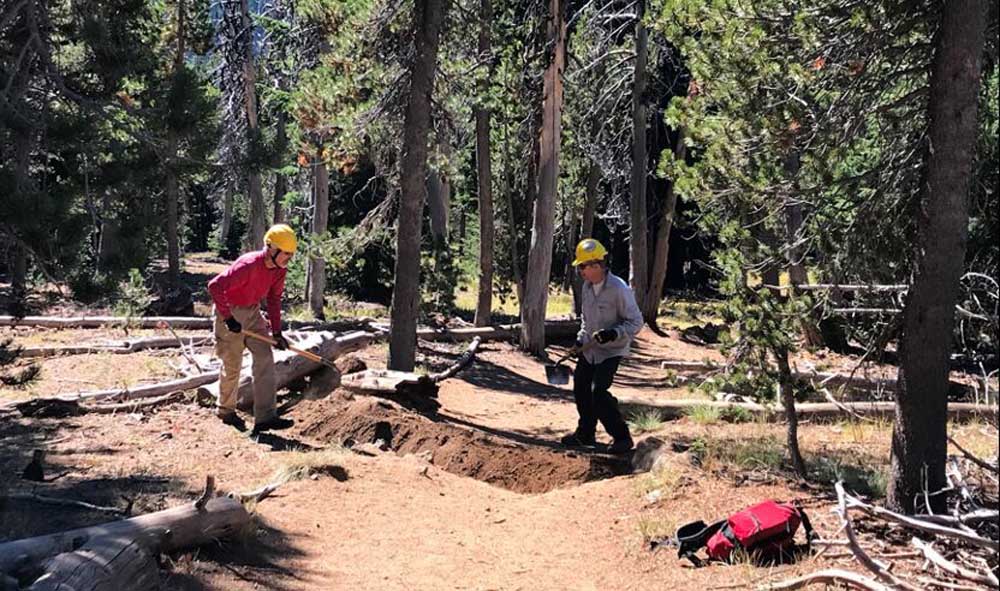Volunteers power much of the trail work in Central Oregon
Published 3:45 am Friday, February 24, 2023

- Installing erosion structures on the Tumalo Mountain Trail.
Curious about the trails in the Deschutes National Forest and the groups that maintain them? Here it is by the numbers.
2,000: There are well over 2,000 miles of winter and summer trails across the Deschutes National Forest. With a limited budget and only a few employees that work directly with trails, the Forest Service relies on volunteers to accomplish most trail maintenance.
25: the number of volunteer organizations that maintain the trails on the Deschutes National Forest. There are more than 1,500 individuals that contributed to this effort last year. That’s a lot of folks!
33,000: the number of hours that volunteers put in last year towards maintaining the trails on the Deschutes National Forest last year. If the Forest Service had to hire people to do that work, it would require about 40 seasonal employees to accomplish it. This work contributes huge benefits to the quality of trails we have all come to love.
The Central Oregon Nordic Club (CONC) is one of the groups that assist in trail maintenance. CONC’s focus is on cross country ski and snowshoe trails plus five warming huts on the Forest. Since this snow season started, CONC has cleared almost 1,000 downed trees from ski and snowshoe trails, ranging in size from small saplings bent over the trail to huge hemlocks nearly 4 feet in diameter that can take an all-day effort to clear.
With more than 100 miles of winter trails to maintain, CONC relies on reports from skiers and snowshoers to let us know about problems on the trail. You can report downed trees or other trail issues through the CONC website (conordicclub.org) use the QR code posted on a kiosk at a sno-park. CONC volunteers will go out and clear the trails as soon as possible.
Fifty-five CONC volunteers contributed more than 3,000 hours of work last year. In addition to clearing downed trees from trails, volunteers prune limbs to enhance visibility of trail markers, replace broken or missing markers, install junction signs, and cut firewood for the warming huts. CONC is also working with the Deschutes National Forest to reroute, construct, and decommission a few trails due to wildlife issues, safety concerns and to disperse users. Funding for tools, markers and signs comes through club dues, donations and grants. The Deschutes Trail Coalition and Visit Bend have helped fund some CONC projects this year through grants.
There’s more to the work that volunteers do than just the numbers. While much of the volunteer work is strenuous, it’s also enjoyable — and the work is in spectacular settings. There is a feeling of accomplishment as you hike/ski/snowshoe back to a trailhead past the work you just finished. If you’re up for a good workout, running a crosscut saw in fresh air is a lot more fun than lifting weights at the gym. The need for trail maintenance is increasing as trail use increases, and more trails in the region are subjected to damage from wildfires and erosion.
Want to get involved? Forest Service Trail Volunteer Coordinator Jessie Larson suggests participating in the Allingham Trail Skills College, held in the Metolius basin June 1-4. The training is hosted by the Deschutes National Forest and Pacific Crest Trail Association and is a good way to get some basic training and to connect with a volunteer group. Most groups also provide on the job training for their trail work.
Want to get involved in helping, but don’t think trail maintenance is your thing? There are a number of opportunities available both summer and winter through Discover Your Forest for areas such as interpretive rangers or helping maintain and stock permits at trailheads. You can find opportunities at discoveryourforest.org/volunteer.








